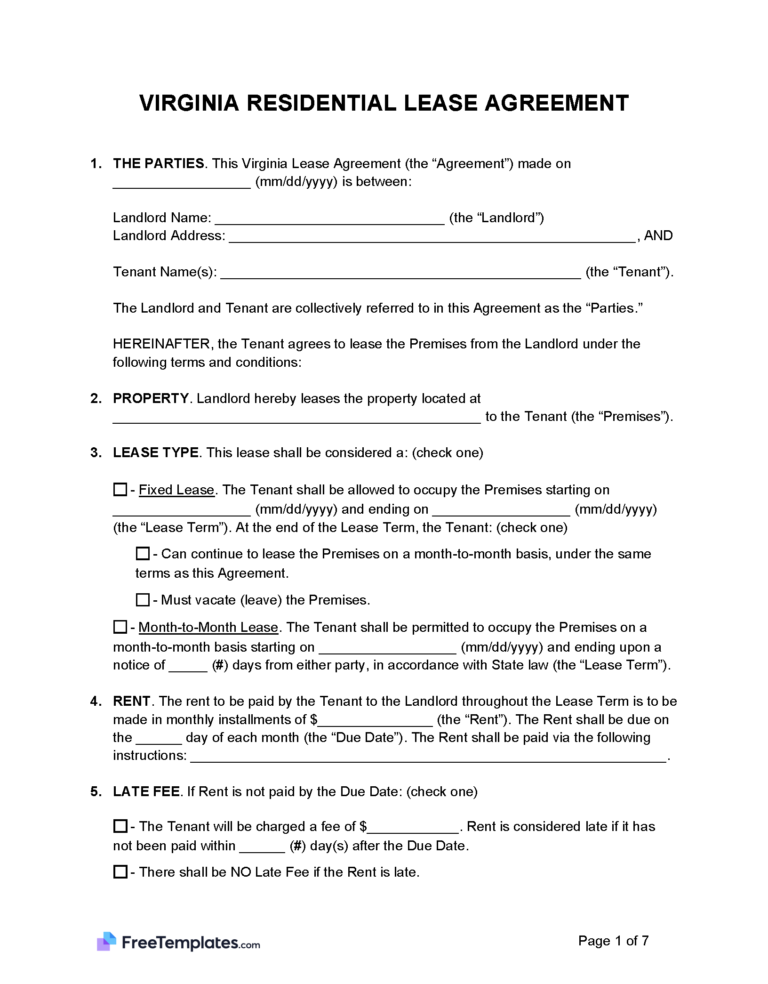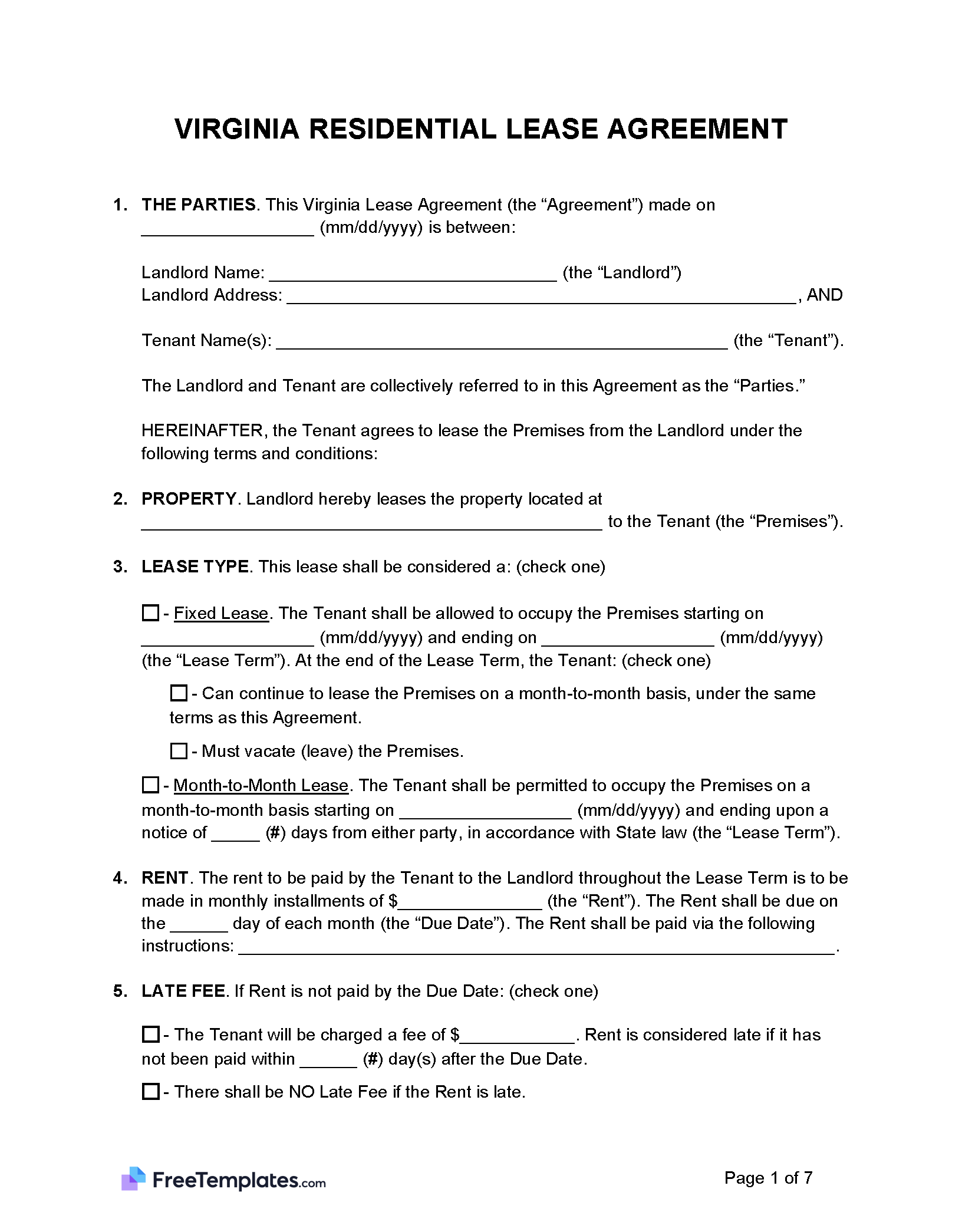By Type (6)
Standard Lease Agreement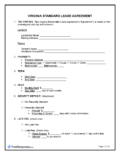 – A binding agreement between a renter and a property owner that conveys real estate for a specific period of time. – A binding agreement between a renter and a property owner that conveys real estate for a specific period of time.
|
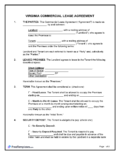 Commercial Lease Agreement – A contract between a landlord and a business that discusses renting a specific property unit. Commercial Lease Agreement – A contract between a landlord and a business that discusses renting a specific property unit.
|
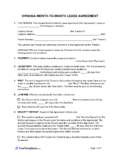 Month-to-Month Lease Agreement – An open-ended contract with no specific end date but can be ended with a 30-day notice. Month-to-Month Lease Agreement – An open-ended contract with no specific end date but can be ended with a 30-day notice.
|
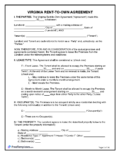 Rent-to-Own Agreement – This is a standard rental lease with the option for the tenant to purchase the property from the landlord. Rent-to-Own Agreement – This is a standard rental lease with the option for the tenant to purchase the property from the landlord.
|
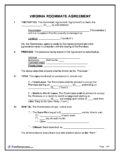 Roommate Agreement – A lease constructed by a tenant to outline the terms of their shared duties as renters. Roommate Agreement – A lease constructed by a tenant to outline the terms of their shared duties as renters.
|
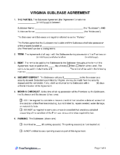 Sublease Agreement – A contract written by a renter to a sub-renter that allows the property to be rented without the landlord’s involvement. In most cases, the landlord must approve the dwelling being sublet. Sublease Agreement – A contract written by a renter to a sub-renter that allows the property to be rented without the landlord’s involvement. In most cases, the landlord must approve the dwelling being sublet.
|
Disclosures (11)
Defective Drywall – If the landlord is aware of any defective drywall in the unit, they must provide a written disclosure of that information to the tenant. (§ 55.1-1218(A))
Demolition or Conversion to Condominium – If a landlord decides to either demolish or convert the property to condos, they must notify the tenants by at least 6 months. The landlord must file for an application with the Real Estate Board or notify the tenants six months ahead of time with the plan of displacing the renter. (§ 55.1-1216(C))
Landlord’s Contact Details – Tenants must have the ability to know the names and addresses of the property owner or operator for the property they are leasing. (§ 55.1-1216(A))
Lead-Based Paint Disclosure – The landlord of any property built prior to 1978 must inform their tenant of possible or known lead-based paint on the premises.
Methamphetamine Disclosure (conditional) – The landlord must disclose any known information regarding methamphetamines present or manufactured on the property in the past. The landlord must ensure that their property has been cleaned in accordance with all state guidelines. (§ 55.1-708)
Military Air Installation Disclosure – The landlord must disclose if their rental property is located in a military air, noise, or accident zone as outlined by local map zoning. (§ 55.1-1217(A))
Mold – The landlord is responsible for disclosing any known mold to the tenant via the Move-In Checklist before the lease starts. (§ 55.1-1215)
Move-In Inspection (conditional) – The landlord is responsible for providing an itemized list reporting any damage done to the property within 5 days of the lease’s start date. (§ 55.1-1214(A))
Sale of Property – If the landlord sells the property while the unit is being rented, the tenant must be provided with the purchaser’s name, address, and phone number. (§ 55.1-1216(B))
Statement of Tenant Rights and Responsibilities – Landlords shall provide any tenant with the Statement of Tenant Rights and Responsibilities form comprised by the Department of Housing and Community Development. (§§ 55.1-1204(B), 36-139(26))
Tourism Activity Zone – Landlords must inform potential tenants if their rental property is deemed in a “tourism activity zone.” The landlord may disclose this information in writing in the lease agreement, making the renter informed that there may be parades, street closures, special events, and entertainment activities in this zone. (§ 55.1-707)
Security Deposit
Maximum Amount – A total of 2 months rent is the maximum security deposit the landlord may charge a renter. (§ 55.1-1226(A))
Returning to Tenant – The security deposit must be returned to the tenant within 45 days of the lease termination or the date the tenant vacates the property, whichever comes first. (§ 55.1-1226(A))
- Itemized List – After the move-out inspection occurs, the landlord must present the itemized list of any damages to the unit to the tenant. (§ 55.1-1226(G))
Landlord Access
Emergency Access – In an emergency, a landlord is allowed to enter the rental property without notification. (§ 55.1-1229(A)(4))
General Access – Landlord access may be granted if the tenant requests maintenance or repair to the unit. A 72-hour notice is required for the landlord to access the unit when not requested. (§ 55.1-1229(A)(4))
Paying Rent
Grace Period – A landlord may charge a late fee to any tenant who fails to pay the rent within 5 days of the due date. If the tenant does not pay within 5 days, they may be served a 5-day notice to quit. (§ 55.1-1245(F))
Maximum Late Fee – The maximum amount a landlord can charge a tenant for late payment is 10% of the monthly rent or 10% of the past-due balance. (§ 55.1-1204(E))
Returned Checks (NSF) – If a tenant writes a bad check, then the landlord may enforce a $50 maximum penalty. (§ 8.01-27.1(B))
Withholding Rent – In the state of Virginia, a landlord is responsible for any damages or infestations that may pose a health risk to the tenant. The landlord has a 14-day grace period to fix the issue. Failure to fix the issue would allow the tenant to hire a third party and withhold up to $1,500 or one month’s rent, whichever is greater. (§ 55.1-1244.1(B),(C))
Reasons for Eviction (5)
Abandonment before End Date – In the lease agreement, a landlord may require the tenant to give notice if they plan to evacuate the unit for longer than 7 days. The landlord has the right to enter the property after 7 days to check if the unit has been abandoned. (§ 55.1-1249)
Lockouts – A landlord is prohibited from intentionally locking out a tenant from the property. (§ 55.1-1243.1(A))
Non-Compliance – If a tenant does not comply with the lease agreement, they may be served a notice to quit for non-compliance. This notice states that the tenant has 21 days to comply, or the lease will terminate in 30 days of delivery. (§ 55.1-1245(A),(B))
Non-Payment of Rent – If the tenant does not pay the rent on time, a 5-day grace period is allowed. Failure to pay after 5 days may result in a 5-day notice to quit or pay rent. (§ 55.1-1245(F))
Tenant Maintenence – A tenant is responsible for keeping a clean, safe space without making any significant changes to the property or damaging the unit. (§ 55.1-1227)
